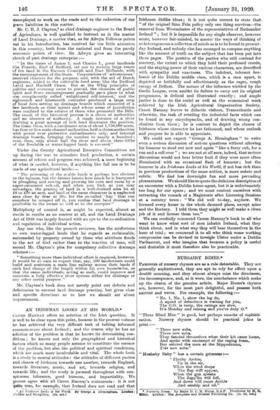AN IRISHMAN LOOKS AT HIS WORLD.*
CANON Harerear offers no solution of the Irish question. It is well to be clear upon this point, because in the present volume he has achieved the very difficult task of talking informed common-sense about Ireland ; and the reason why he has no sohition of the problem is that he knows its determining con- ditions : he knows not only the geographical and historical factors which so many people assume to constitute the essence of the problem, but also the political and spiritual conditions, which are much more incalculable and vital., The whole book is a study in mental attitudes : the attitudes of different parties and classes of Irishmen towards one another, towards England, towards literature, music, and art, towards religion, and towards life ; and the study is pursued throughout with con- spicuous tolerance, good humour, and impartiality. We Rennet agree with all Canon liannay's statements : it is not quite true, for example, that Ireland does not read and that An Irishman Looks at Ms World. Sy George A Birmingham. Yeacton: 1-%dge:aul Stouhton. Pa. net.) Irishmen dislike ideas ; it is not quite correct to state that.. "of the original Sinn Fein policy only one thing survives—the removal from Westminster of the representatives of Nationalist Ireland " ; but it is impossible for any single observer, however acute, however fair-minded, to master the ways of thinking of so heterogeneous a collection of minds as is to be found in present- day Ireland, and nobody else has managed to compass anything like the amount of truth on the subject that has been put into these pages. The position of the parties who still contend for mastery, the extent to which they hold their professed creeds, and the staying-power of their various characters, are described with sympathy and exactness. The indolent, tolerant bon- homie of the Dublin middle class, which is a race apart, is depicted as faithfully and affectionately as the eager, rough energy of Belfast. The nature of the influence wielded by the Gaelic League, even amidst its failure to carry out its original programme, is defined and illustrated exactly ; and ample justice is done to the social as well as the economical work achieved by the Irish Agricultural Organization Society. Canon Hannay leaves to didactic visitors, Transatlantic and otherwise, the task of retailing the industrial facts which can be found in any encyclopaedia, and of drawing wrong con- clusions from thorn; he is content to depict the classes of Irishmen whose character he has fathomed, and whose outlook and purpose he is able to appreciate.
We could not expect "George A. Birmingham" to write even a serious discussion of serious questions without allowing his humour to steal out now and again "like a furry cub, for a run and a roll over " ; we are not at all sure, indeed, that serious discussions would not bear better fruit if they were more often illuminated with an occasional flash of humour; but the humour in An Irishman Looks at his World, if not less rich than in previous productions of the same author, is more sedate and subtle. We find less downright fun and more pervading pleasantness. We should like to quote the delicious description of an encounter with a Dublin house-agent, but it is unfortunately too long for our space ; and we must content ourselves with extracting the remark of a Magistrate after Licensing Sessions at a country town : "We did well to-day, anyhow. We licensed every house in the whole damned plate, except mine and the Rectory. I told them they might as well make a clean job of it and license them too."
We can cordially commend Canon Hannay's book to all who want to know what sort of men inhabit Ireland, what they think about, and in what way they will bear themselves in the hour of trial ; we commend it to all who think some working compromise can be devised to inveigle Ulster under a Dublin Parliament, and who imagine that because a policy is useful and desirable it must therefore also be practicable.


































 Previous page
Previous page